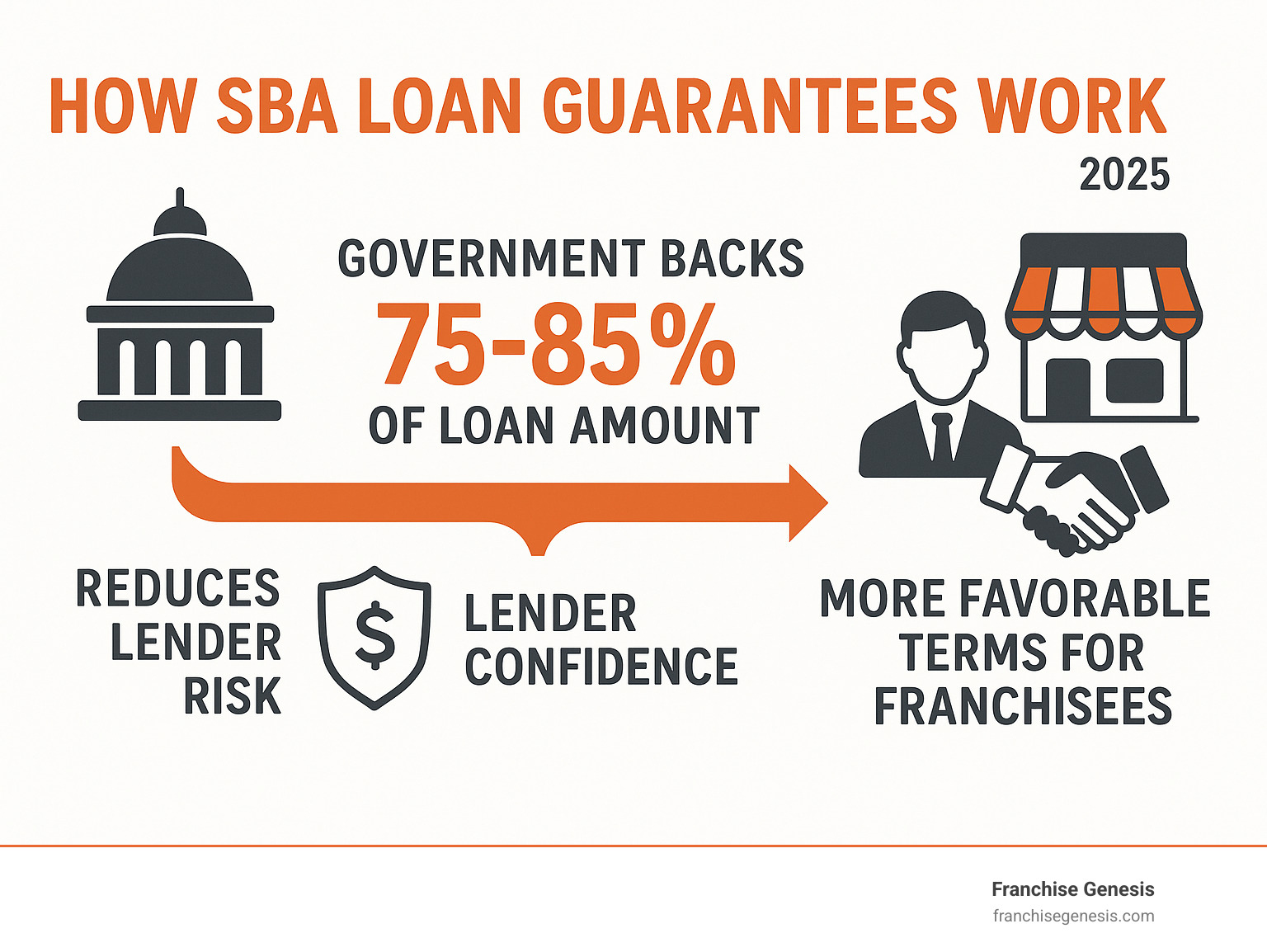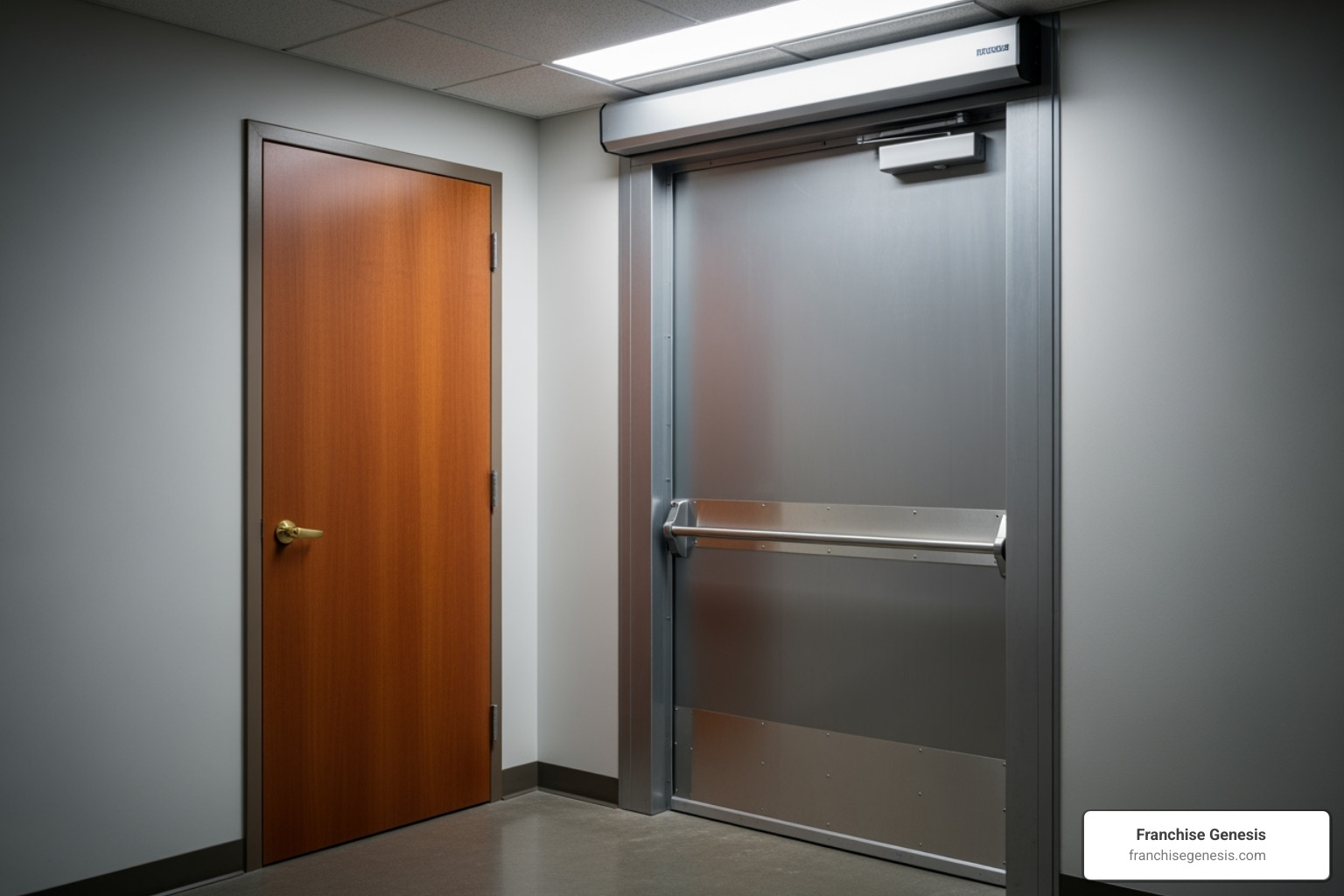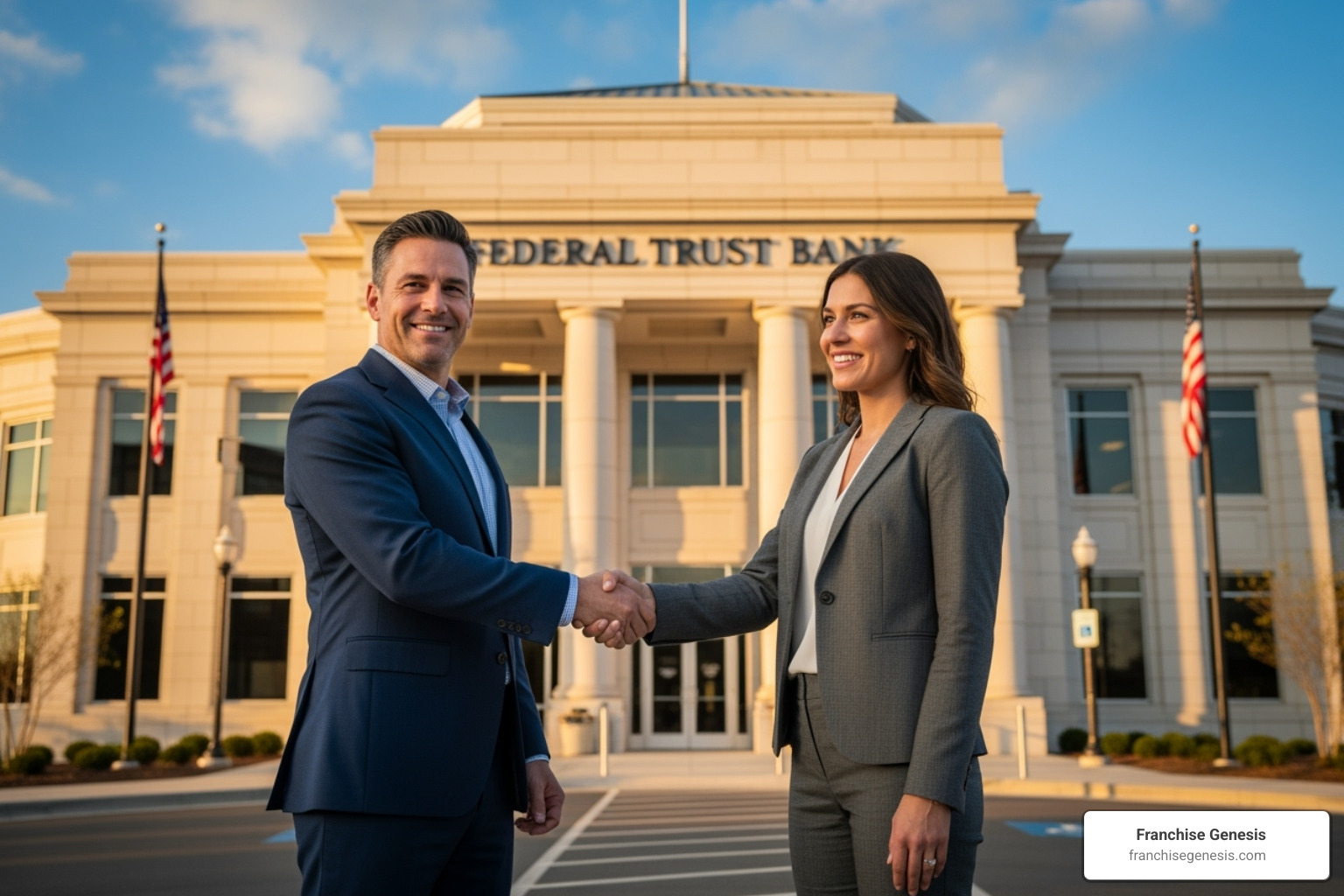Fueling Your Franchise Expansion Dreams
Franchise financing sba loans are a powerful tool for growing your franchise system, making ownership accessible to qualified candidates who might otherwise lack capital. Here’s what every franchisor needs to know about SBA financing:
Key SBA Loan Benefits for Your Franchisees:
- Lower down payments – typically 10-20% vs. 25-30% for conventional loans
- Longer repayment terms – up to 25 years for real estate, 10 years for equipment
- Competitive interest rates – government backing reduces lender risk
- Higher approval rates – SBA guarantee encourages lender participation
Main SBA Programs for Franchises:
- SBA 7(a) loans – up to $5 million for working capital, equipment, and franchise fees
- SBA 504/CDC loans – up to $5.5 million specifically for real estate and major equipment
The numbers tell the story: roughly 10% of all SBA loans go to franchises, and the initial investment for most franchises ranges from $75,000 to $500,000. When your franchisees can access government-backed financing with favorable terms, it directly impacts your ability to attract qualified candidates and accelerate system growth.
As Monique Pelle Kunkle, Vice President of Operations at Franchise Genesis, I’ve seen how crucial financing support is. Guiding franchisors through franchise financing sba programs has shown me that understanding your franchisees’ financing journey is key to building a stronger, more successful network and gaining a competitive advantage.

Why SBA Loans are a Game-Changer for Your Franchise System
When growing your franchise system, helping qualified candidates access the capital they need is a major hurdle. Franchise financing sba programs are your secret weapon for brand expansion.
Imagine the perfect franchise candidate—experienced, passionate, and a great fit for your brand. If they can’t secure financing, that potential vanishes, and your growth stalls.

SBA loans change this dynamic. With lower down payments, longer repayment terms, and competitive interest rates, your franchise opportunity becomes accessible to a much wider pool of talented candidates. This gives you a significant competitive advantage in attracting qualified franchisees who might otherwise choose a different brand or give up on franchise ownership.
The ripple effect is powerful. More accessible financing means faster brand expansion, leading to a stronger market presence and increased brand recognition. It’s a cycle that feeds itself—the more successful franchisees you have, the more attractive your system becomes to both future franchisees and lenders.
For more insights on building this growth momentum, check out our guide on Franchise Growth Strategies.
The Key Advantages for Your Franchisees
SBA loans solve the most common financing challenges your franchisees face. Lower equity injection is the biggest game-changer—instead of requiring 25-30% down like conventional loans, SBA loans typically ask for just 10-20% of the total investment.
This preserving capital benefit is huge. When your franchisees don’t have to drain their savings for the down payment, they have working capital for startup expenses, marketing, or simply peace of mind during the first few months of operation.
The favorable terms extend beyond down payments. Repayment periods can stretch up to 25 years for real estate, which dramatically reduces monthly payment pressure. Your franchisees can focus on growing their business instead of scrambling to make loan payments.
Increased approval rates are another major advantage. Because the SBA guarantees 75-85% of the loan amount, lenders are much more willing to say “yes” to candidates who might not qualify for traditional financing. This means you’re building a strong network of franchisees who are financially positioned for success from day one.
Understanding these advantages helps you see why franchising can be such a powerful growth strategy. Learn more about the broader benefits on our Why You Should Franchise page.
Understanding the Drawbacks and Challenges
It’s also important to be honest about the challenges. Setting franchisee expectations properly is crucial for maintaining trust and ensuring smooth franchise relationships.
The longer application process is a common frustration. SBA loans typically take 60-90 days from application to funding, unlike some faster alternative lenders. This is due to the multiple review layers of a government-backed program.
Extensive paperwork is another reality. Franchisees must gather numerous documents, from personal tax returns and financial statements to your Franchise Agreement. Each document is necessary for the underwriting process.
Collateral requirements and personal guarantees are serious considerations. For loans over $25,000, lenders typically require collateral, and all SBA loans require personal guarantees. This means your franchisees are personally on the hook if the business fails—a responsibility that shouldn’t be taken lightly.
The key is helping your franchisees understand that while these requirements might seem daunting, they’re also protecting everyone involved. The thorough vetting process helps ensure that only serious, committed candidates move forward, which ultimately strengthens your entire franchise network.
Decoding the Main SBA Loan Programs for Franchisees
Choosing the right franchise financing sba program is like picking the right tool for a job. Two main programs dominate the landscape, and each has its sweet spot.

The SBA 7(a) loan is your Swiss Army knife—versatile and ready for almost anything. The SBA 504/CDC loan, on the other hand, is a precision instrument designed for major fixed asset purchases. Understanding which program to recommend can make the difference between a smooth and frustrating funding experience for your franchise candidates.
Here’s how these two powerhouses stack up:
| Feature | SBA 7(a) Loan | SBA 504/CDC Loan |
|---|---|---|
| Use of Funds | Versatile: working capital, equipment, inventory, real estate, franchise fees, debt refinancing | Fixed assets only: land, buildings, long-term machinery/equipment, construction, renovation |
| Loan Amount | Up to $5 million | Up to $5 million (up to $5.5 million for energy projects) |
| Repayment Terms | Up to 25 years for real estate, 10 years for equipment/working capital | Up to 25 years for real estate, 10 years for machinery/equipment |
The beauty of having both options is that your franchisees can choose the program that best matches their specific needs and business model.
The SBA 7(a) Loan: The All-Purpose Tool
The 7(a) loan is the workhorse of franchise financing sba. It’s flexible, accommodating, and can be used for almost any business purpose.
Your franchisees can use 7(a) funds for working capital to keep the lights on, cover franchise fees, purchase equipment from ovens to computers, and even buy real estate. Need inventory to stock the shelves? The 7(a) loan has that covered too.
The program is attractive due to its generous loan amounts up to $5 million, which covers most franchise startup costs. Repayment terms are also franchise-friendly: up to 25 years for real estate and 10 years for equipment and working capital.
The flexibility of the 7(a) program means your franchisees can create a comprehensive funding package that addresses multiple startup needs with a single loan application. For the complete details on this incredibly useful program, we always point our partners to the official source: More information on 7(a) loans.
The SBA 504/CDC Loan: For Major Asset Purchases
While the 7(a) is versatile, the SBA 504/CDC loan is for substantial fixed-asset investments. It excels at financing major purchases like building acquisition, construction, or heavy machinery that will serve the business for years.
One of the most appealing features is the long-term fixed rates that can extend up to 25 years. This stability helps your franchisees plan their finances with confidence, knowing their monthly payments throughout the life of the loan.
The 504 program has a unique structure involving a Certified Development Company (CDC), a non-profit focused on economic development. The CDC provides 40% of the project cost, a traditional lender covers 50%, and your franchisee contributes at least 10%. This partnership often results in very competitive terms.
However, there’s an important limitation: the 504 loan is not for working capital. It won’t help with inventory, daily operating expenses, or debt consolidation. It’s laser-focused on fixed assets and comes with job creation requirements—typically one job for every $90,000 borrowed.
Understanding these distinctions helps you guide your franchise candidates toward the financing solution that truly fits their business model and growth plans.
How Your Franchisor Role Impacts Franchise Financing SBA Success
As a franchisor, your influence on your franchisees’ franchise financing sba success is immense. Your reputation, track record, and support systems are evaluated right alongside your franchisee’s application.

When lenders review a franchise loan application, they evaluate your entire franchise system. A strong brand reputation—built on successful locations, solid unit economics, and low failure rates—instills lender confidence in every application.
Your proven business model becomes a selling point that individual entrepreneurs can’t match. Lenders know that franchisees benefit from tested systems, established supplier relationships, and operational playbooks that reduce the typical risks associated with startup businesses. This systematic approach often translates to higher approval rates for your franchisees.
The quality of your training programs also factors into lending decisions. Banks understand that well-trained franchisees are more likely to succeed and repay their loans. When you can demonstrate robust initial training and ongoing support, you’re providing lenders with risk mitigation.
Many successful franchisors develop preferred lender relationships, creating streamlined pathways for their franchisees to access funding. These partnerships can significantly accelerate the application process and improve approval odds. If you’re ready to take your business to the next level through franchising, explore how we can help you build these crucial systems at Franchise Your Business.
Key Eligibility Factors for Franchise Financing SBA
The SBA’s approach to franchise eligibility has evolved. While the SBA discontinued its public Franchise Directory in May 2023, lenders now make their own determinations based on one critical question: Does your franchisee truly own their business?
The most important factor is ensuring your Franchise Disclosure Document (FDD) and Franchise Agreement show genuine franchisee ownership. The SBA requires that franchisees have the “right to profit from efforts commensurate with ownership”—meaning they must function as real business owners, not just managers of your brand.
This means your Franchise Agreement must balance brand standards and operational consistency while avoiding excessive control that undermines franchisee ownership. If your agreement gives you too much control over day-to-day operations, staffing, or profit distribution, it could jeopardize your franchisees’ SBA loan eligibility.
The SBA particularly scrutinizes agreements for franchisee independence in areas like vendor selection, operational decisions, and profit retention. Your franchisees should have reasonable flexibility in running their businesses within your brand guidelines and retain the majority of profits from their efforts.
Understanding these nuances is crucial for franchise development. A well-structured Franchise Agreement that meets SBA guidelines opens doors for your franchisees while protecting your brand. For detailed information about the SBA’s current stance, review their official guidelines at SBA’s view on franchisee ownership rights.
Preparing Your Franchisees: The Business Plan and Documentation
Your role in preparing franchisees for the SBA loan process can make the difference between approval and rejection. A well-prepared application demonstrates the professionalism and viability of your entire franchise system.
The business plan is the cornerstone of a successful loan application. It’s a strategic document that must articulate your franchise’s value proposition, include market research, present realistic financial projections, and outline a repayment strategy. The strongest plans combine your franchisor-provided data with the franchisee’s local insights.
Financial projections deserve special attention, as they directly impact loan approval. These typically include 3-5 years of projected profit and loss statements, cash flow analyses, and balance sheets. Your experience with existing locations provides invaluable data that strengthens these projections.
The documentation requirements for franchise financing sba applications are extensive. Essential documents include the SBA Loan Application Form (SBA Form 1919), Personal Financial Statement (SBA Form 413), and Statement of Personal History (SBA Form 912). Your Franchise Agreement will receive particular scrutiny, as will personal and business tax returns from the past three years.
Additional required documents often include business licenses and permits, real estate appraisals, documentation of business debt, and incorporation documents. Any assistance from brokers or consultants must also be documented.
Your guidance through this process adds tremendous value to your franchise offering. Franchisees who feel supported through financing are more likely to become successful, satisfied operators.
Guiding Franchisees Through the Application Journey
The franchise financing sba application process can feel overwhelming for franchisees. We guide them every step of the way, turning a stressful maze into a clear path toward their business ownership dreams.

The journey typically unfolds in four main stages: lender selection, where we help identify the right financial partner; application submission, ensuring every document is in order; the underwriting process, where patience is key; and finally, approval and funding.
Most franchisees can expect this process to take anywhere from 30 to 90 days. While that might seem long, proper preparation and choosing the right lender can significantly speed things up. Think of it as building a solid foundation for long-term success.
Our approach to guiding franchisees through financing mirrors our broader philosophy of changing leads into loyal partners. We’re not just processing applications; we’re nurturing relationships that will thrive. You can learn more about our comprehensive approach on our Transform Leads into Loyal Franchisees with a Proven Sales Strategy page.
Choosing the Right SBA Lender
Finding the right lender is like finding the right business partner—it can make all the difference. Not every bank understands the franchise world, which is where our guidance becomes invaluable.
We encourage franchisees to seek lenders with Preferred Lender Program (PLP) status. These banks have proven SBA lending expertise and can make credit decisions without waiting for SBA approval on most loans. This means faster processing and fewer delays.
Experience with franchises is another crucial factor. Some banks have dedicated franchise lending teams who understand franchise agreements and business models. These lenders don’t just see numbers; they see the potential for success.
For franchisees who want to explore options independently, we recommend the SBA Lender Match tool. This online service connects borrowers with participating lenders in their area.
The choice between local and national banks often comes down to personal preference. Local banks might offer a personal touch and local market knowledge, while national banks often bring broader experience and streamlined SBA processes. Many successful franchisors have preferred lender relationships, and we always encourage exploring these partnerships first.
Exploring Alternative Financing Options
While SBA loans are excellent, we provide franchisees a complete picture of their financing landscape. Sometimes, alternative options are more attractive due to timing, specific needs, or individual circumstances.
Franchisor financing is one avenue. While only about 12% of franchisors offer it, those who do can provide quick funding solutions, such as financing portions of the initial franchise fee.
For franchisees with strong credit, conventional bank loans might offer lower costs and faster approval, though they usually involve higher down payments.
Equipment financing works well when the primary need is for specific machinery. Since the equipment serves as collateral, these loans often have easier qualification requirements.
Business lines of credit provide flexibility for ongoing operational needs. Franchisees can access funds as needed, paying interest only on what they use.
Finally, Rollovers as Business Startups (ROBS) allows using retirement funds without penalties or taxes. This powerful option requires careful consideration, as it involves risking retirement savings.
Frequently Asked Questions about SBA Loans for Franchises
It’s natural to have questions when navigating franchise financing sba. We hear a few common ones all the time from business owners looking to grow their brand through franchising. Let’s tackle them head-on.
How does a franchisor get their brand listed as SBA-eligible?
This is a common question. The SBA stopped updating its public Franchise Directory in May 2023, so your brand won’t be “listed” there in the traditional sense.
However, your brand can still be considered “SBA-eligible.” The responsibility now falls to individual lenders to make that determination. They’ll closely examine your Franchise Agreement and Franchise Disclosure Document (FDD).
Simply put, your Franchise Agreement must show that franchisees have enough control over daily operations and management to be considered genuine business owners, not just managers. Lenders will also check that your fee structure allows for healthy franchisee profitability. A clear, fair, and transparent FDD and Franchise Agreement are key to proving your model fosters entrepreneurship.
What is the typical down payment for a franchisee using an SBA loan?
This is a key reason why franchise financing sba loans are a game-changer. Unlike conventional loans that can require 25-30% (or more) of the project cost upfront, SBA loans typically require a much lower equity injection.
For the popular SBA 7(a) loan, your franchisees might only need to put down as little as 10% to 15% of the total project cost. Some lenders might ask for up to 20%, but that’s still a significant reduction compared to other options. This lower upfront cash requirement is a huge benefit, making your franchise opportunity accessible to a broader pool of talented individuals. It truly lowers the barrier to entry and helps you attract more fantastic franchise partners.
Can my international franchisees get SBA loans?
Unfortunately, the answer here is a straightforward “no.” The U.S. Small Business Administration (SBA) was created to support small businesses in the United States and its territories. Its mission is focused on fostering economic growth and job creation within U.S. borders.
So, while SBA loans are an incredible resource for your U.S.-based franchisees, they aren’t available for your international franchise partners. For global expansion, you’ll need to explore other financing avenues specific to those regions. But for your domestic growth, the SBA remains a cornerstone of your franchise financing sba strategy.
Conclusion: Build a Stronger Franchise Network with Smart Financing
When you franchise your business, understanding franchise financing sba is one of your most powerful tools for growth. It’s not just about securing funding; it’s about creating a strategic advantage that transforms your expansion strategy.
Every qualified candidate lost to a lack of financing is a missed opportunity. When you understand and guide franchisees through the SBA loan process, you remove one of the biggest barriers to ownership. You’re essentially empowering your network from the start.
The numbers speak for themselves. With SBA loans offering lower down payments (typically 10-20% versus 25-30% for conventional loans), longer repayment terms, and competitive interest rates, you’re making your franchise opportunity accessible to a much wider pool of talented entrepreneurs. This isn’t just good for them—it’s strategic growth for you.
At Franchise Genesis, we’ve seen that franchisors who master financing build stronger networks. When franchisees access capital with favorable terms, they don’t just survive—they thrive. Thriving franchisees become your best advocates for future growth.
The beauty of SBA loan advantages lies in their ripple effect. Better-funded franchisees mean faster unit growth, stronger brand presence, and ultimately, a more valuable franchise system. It’s about creating a foundation where success breeds success.
Whether you’re just starting to explore franchising or you’re ready to accelerate your system’s growth, understanding franchisee financing is essential. We’re here to help you steer every aspect of building a franchise system that works.
Ready to turn your business into a franchise powerhouse? Learn more about our Services for Franchisors and Franchisees and find how our Franchise Genesis expertise can help you build the thriving franchise network you’ve envisioned.
